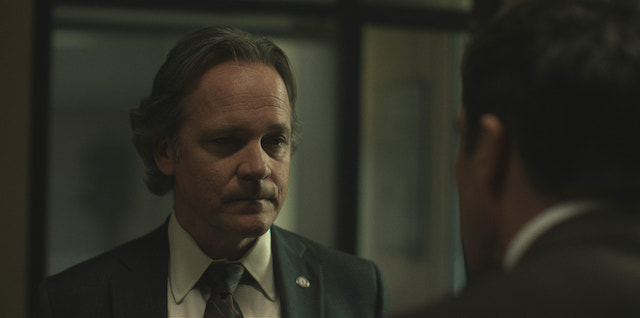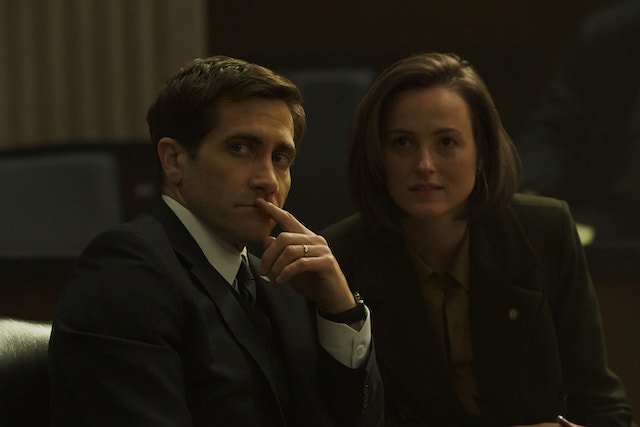
In 1987, Scott Turow kicked off the legal thriller craze with his surprise bestselling novel Presumed Innocent, which still boasts one of the most famous twist endings since Agatha Christie’s Murder on the Orient Express. Fans will happily view Apple TV+’s new series adaptation, even though they have already read the novel and seen Alan J. Pakula’s 1990 film, just to watch how it builds towards Turow’s career-defining revelation. Yet, those who think they know who the real killer is, might start second-guessing, given how widely the new series diverts from the source novel. Nevertheless, former prosecutor Rozat “Rusty” Sabich still finds himself on trial for the murder of his ex-lover and colleague in creator David E. Kelley’s eight-episode Presumed Innocent, which premieres Wednesday on Apple TV+.
Carolyn Polhemus was murdered at an extremely inconvenient time. Sabich’s boss, District Attorney Raymond Horgan already faced a difficult re-election campaign against his former protégé, Nico Della Guardia. Under public pressure to file an indictment, Horgan assigned Sabich to the high-profile case, unaware of his romantic history with the victim. Of course, Sabich is keenly aware of his potentially incriminating connections to Polhemus, but his efforts to cover his tracks ironically draw unwanted attention to himself.
To make matters worse, Sabich suspects fellow prosecutor Tommy Molto is hindering the investigation, in hopes of sabotaging Horgan’s re-election. Currently considered the office pariah, Molto anticipates a promotion after Della Guardia’s ascension—which the voters soon deliver.

©Courtesy of Apple TV+
With Molto now running the investigation, Sabich expects the worse. His obsessive text messages look bad and his presence at the crime scene shortly before Polhemus’s death is even harder to explain away. Sabich knows he needs an experienced lawyer, exactly like Alejandro “Sandy” Stern, but instead, he hires his former boss, Horgan.
At this point, longtime Turow fans are probably wondering how this could be, especially since Turow is credited as an executive-producer (along with J.J. Abrams). Sandy Stern became a regular presence in all Turow’s legal thrillers and the primary protagonist of his second novel, The Burden of Proof, but he is only name-dropped briefly in the series.
Yet, it must be stipulated for the record, Bill Camp’s performance as Horgan is absolutely the best thing going for Kelley’s series. His crusty legal gamesmanship is highly entertaining to watch. However, that necessarily sacrifices the original intrigue revolving around Horgan’s own secret affair with Polhemus, since his integrity and fidelity now remain unimpeached throughout Kelley’s series.
In contrast to the perfectly cast Camp, Jake Gyllenhaal is just a bad fit for Sabich. He simply looks too young and lacks the rumpled world-weariness and grizzled charm Harrison Ford brought to the role in the Pakula film. Gyllenhaal’s chemistry with Ruth Negga as Sabich’s wronged wife Barbara is also questionable.
On the other hand, Peter Sarsgaard (Gyllenhaal’s brother-in-law) humanizes the sleazy Molto to a surprising extent, while chewing the scenery with slimy delight. O-T Fagbenie is also a sly scene stealer as the brutally acerbic Della Guardia. Frankly, Sarsgaard and Fagbenie are the two cast-members who arguably outshine their counterparts in the 1990 film. (Whereas, it is impossible to compare Camp to Brian Dennehy, his movie predecessor, because Kelley and co-writers Miki Johnson and Sharr White have so completely altered Horgan’s character.)
So, this is not Presumed Innocent as readers and fans have always known it. The premise of a prosecutor accused of murder by his former colleagues still holds plenty of suspenseful promise. Unfortunately, the execution feels conspicuously padded. These eight fortysome minute episodes, directed by Anne Sewitsky (Sonja: The White Swan) and Greg Yaitanes, easily could have been condensed down to five—at least. After all, the film clocked in just over two hours, while keeping more faithful to the original novel.
 ©Courtesy of Apple TV+
©Courtesy of Apple TV+
Weirdly, Kelley’s series is also less cynical regarding the legal system than the book or film. It not only rehabilitates Horgan’s dubious ethics, it also sanitizes presiding Judge Lyttle, who was considerably compromised in previous incarnations. Consequently, this Presumed Innocent lacks the same bite.
What is does have are the colorful performances from Camp, Sarsgaard, and Fagbenie. Thanks to them, the first seven episodes provided for review maintain a healthy level of watchability. Hilariously, Apple held back the final episode, maybe because they did not want to “spoil” the ending, even though 90% of the audience for Presumed Innocent already know who did it—at least we think we do. If we don’t, that will really be a scandal.
Arguably, Kelley’s re-conception of Presumed Innocent might have worked better if he had started from absolute scratch instead. Gyllenhaal just isn’t Sabich and Sandy Stern will be missed by everyone who knows the property. Even viewers unfamiliar with the source novel or the prior film will find it takes far too much time for each episode to get going. For Turow fans, it is almost recommended as a bizarre curiosity piece, to see how far it veers off the printed page. For everyone else, Kelley’s Presumed Innocent is an inconsistent legal thriller that needed a firmer editorial hand, despite some colorful supporting turns. It starts streaming Wednesday (6/12) on Apple TV+.
Grade: C+
If you like the article, share your thoughts below!
Check out more of Joe’s articles.
Here’s the trailer of the series.

